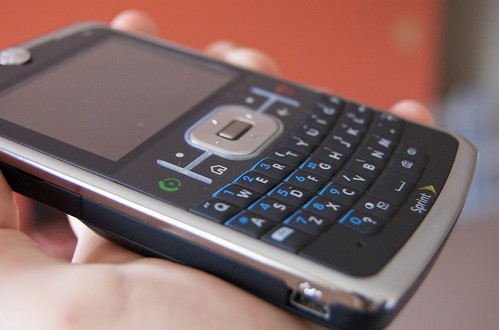 In the schools my children attend, mobile phones are not welcome. The regional district school board is jamming the genie back into the lamp, even though the use of handheld technology is ubiquitous in the real world. Rather than restrict the use of this technology, educators (and their students) would be better served, if they were actually to be encouraged to use this technology in their classrooms.
In the schools my children attend, mobile phones are not welcome. The regional district school board is jamming the genie back into the lamp, even though the use of handheld technology is ubiquitous in the real world. Rather than restrict the use of this technology, educators (and their students) would be better served, if they were actually to be encouraged to use this technology in their classrooms.How can cell phones be used for education?
First, we have to realize that many cell phones have the many embedded tools: clock, calendar, camera, voice recorder, text messaging. Some cell phones also include access to the World Wide Web and GPS technology.
Recognizing that relatively few educators already leverage tools likeGooglemaps, Wikipedia, and today's Front page news.... How will we handle it when "all of the information in the world" arrives in student backpacks on a daily basis?
The inclination is to think of the Web as one way communication, but teachers need to recognize that handheld devices encourage participation in content creation as much as content consumption. The mobile phone provides the potential to teach about copyright; content creation; protection of privacy; ethical use and much more. So how do we go about teaching students about appropriate online participation?
Documenting Learning
Field trips, experiments, and other learning experiences can be shared with a global audience with camera phones (audio and/or video). Many ideas for using mobile phones can be found at The Mobile Learner, Wes Fryer's wiki, or Thinking Machine. Evolving tools like Jott and Utterz allow automatic voice to text posting to blogs, wikis, or social networks. If you already use Voicethread, you may be interested in the untethered use of this tool:
Liberty Science Centre in New Jersey, actually has exhibits that provide audio commenting through recordings available by phone call. Can students create such content? Can you see the day when road signs, historic markers, and public buildings include phone numbers to access information? What about copying such information to GoogleMaps?
Large Scale Mobile Learning
Abiline Christian University in Texas, provides students with iPhone technology. Many other post-secondary institutions like Berkeley, Stanford, Yale, Penn State, Texas A&M, Duke, Queens, MIT... are leveraging iTunes U. Will this soon be the norm? What about iTunes HS, or iTunes Elementary?!
What are we worried about?
Students filming lessons? Students Googling to correct teacher errors? Students communicating with one another for social reasons? Whatever the concerns, the appropriate use of handheld computing technology needs to be modeled in the classroom. In preparing students for the real world, is teaching handheld technology skills more relevant than cursive writing; long division; spelling tests, the memorization of world capitals...?
More to follow on Monday's Teacher 2.0 Podcast.
Photo credit: Benjamin Golub




9 comments:
unfortunately, the whole mobile phone industry is doing everything it can to hinder people, stop networks from being two-way, cash in on their (newly found) needs etc. it is a shame that a development with so much potential is in the grip of an industry so shamelessly exploiting it.
the fact that everybody was surprised when apple managed to coerce the "visual voicemail" feature from the providers demonstrates my point very clearly.
peter
I touched on something similar recently on my blog
I use my phone to store images of things I need to remember. What's wrong with students harnessing this too? - photographing experimental setups, videoing practical work, voice memos. All of which can be recalled a long time after the lesson to aid revision.
That's really interesting Danny. It looks like you began blogging right around the time I did.
More and more we are relying on microchips as our memory storage devices, yet we insist on testing student recall without allowing access to the devices, Wikipedia, or Google.
In fact, much of the reason I like to blog, is it allows me to store my ideas online for later reference and retrieval...
Yeah I blog for the same reasons sometimes. I know I can lay my hands on X or Y piece of information when I need it during training - or I can give the address to someone I am training
Some of the problems are:
Taking photos of tests and passing them on to other students in a matter of seconds...
Taking photos of students in locker rooms, bathrooms, other inappropriate areas....
Sexting....
Texting answers of test questions to other students...
Spreading rumors in a blink of the eye...
A non-filtered web that can be used to spread content that some parents do not want their children exposed to...
While I do think schools, parents, and students need to explore the possibility of cell phone use in the classroom, it is not a simple as you make it sound.
Mobile phone using has some restrictions in most of the schools. Uses of cell phones should be introduced to serve better educational system to the students.
cell phones
There are many problems to you're theory, as an anonymous commenter pointed out, however, as a high school student, I know that just because phones are banned from the classroom does not mean we do not use them. I, in fact, use my phone every day in most classes. I don't use it to cheat or plan drug deals or fights, and the people using phones to do those things, well they're going to do it anyways.
Having a cell phone is advantageous and can be beneficial in certain circumstances but its use in class should be banned, save for emergency situations. Using a cell phone in class is an entirely different scenario than just having one in class. Instead of actively participating in listening and discussions, students are tempted to text with their friends or even receive calls, disrupting the entire learning environment. This can be very frustrating to students who really want to learn, as well as to teachers who really want to teach. Cell phones are an invaluable resource in today's world, but there is a time and place where their use is appropriate. Using one in a classroom is inappropriate because there is no good reason to justify it. Visit recycle mobile phones for more information.
Mobile phones are becoming more and more advanced, with multiple applications that can be used for various reasons. If schools can afford to, I imagine they could be a useful learning tool, but it's all a question of cost. Teachers would also need to figure out how to prevent children from using them for the wrong reasons, as they could easily be distracted by other uses.
Post a Comment